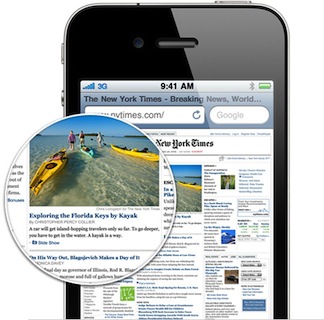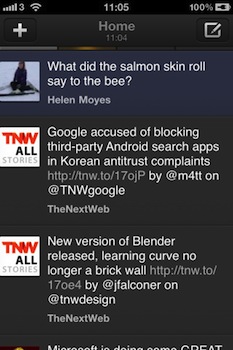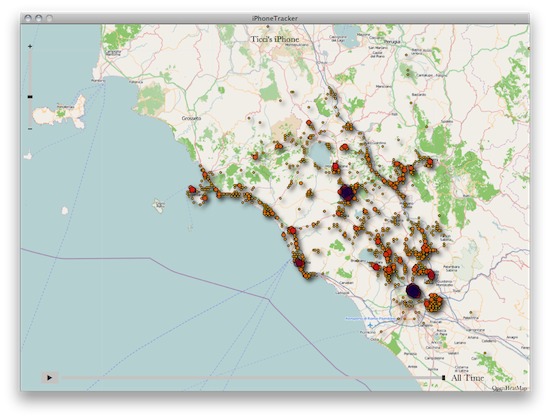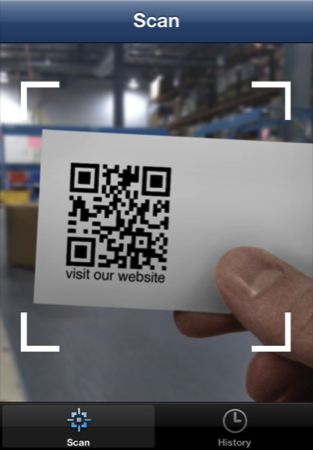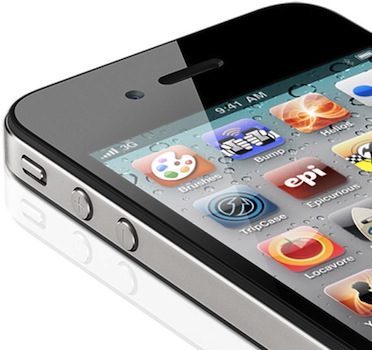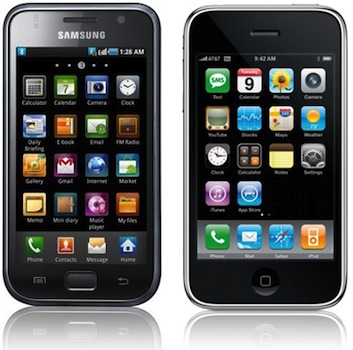Here are today’s @MacStoriesDeals on iOS, Mac, and Mac App Store apps that are on sale for a limited time, so get them before they end!
Posts tagged with "iPhone"
#MacStoriesDeals - Tuesday
iPhone 6 To Use Next-Gen Thinner Displays from Sharp?
Japanese newspaper Nikkan is today reporting that Apple may have made a display component deal with Sharp for the display of the sixth-generation iPhone. It is based on reports that Sharp has begun preparation for the start of manufacturing in Spring next year at its Kameyama plant in Japan for an iPhone display using next-generation technologies.
Sharp will reportedly be producing “low temperature poly-silicon technology” displays, a next generation technology that will allow displays to be thinner and lighter whilst consuming less power than a current LCD display. The key component of these new displays is the polycrystalline silicon, which enables display drivers to be mounted directly onto the glass and thus have a thinner display. Other advantages of the technology include displaying a more vivid image and enhanced durability because of a reduced number of connecting pins.
Previous rumors had circulated that Apple had sided with Toshiba for future display manufacturing – but a Sharp representative disputed this at the time. In a similar vein, Tim Cook commented in January at the Q1 earnings call that Apple had entered a $3.9 billion component supply deal. He didn’t specify what component it was for, but it was speculated that it was for high-resolution displays and that the deal was between Toshiba, Sharp and a third manufacturer. Sharp was also at the center of another display rumor back in January in which they were supposedly preparing to manufacture glasses-free 3D displays for the iPod Touch.
[Nikkan [Google Translate] via AppleInsider]
The “Re-Imagined” TweetDeck 2.0 iPhone App Hits The App Store
TweetDeck has today released its completely new 2.0 iPhone app that has received a “Hollywood re-imagining”, being rebuilt from the ground up to be “fast, flexibe and full-on powerful.” The update, which has been a long time coming, adds a number of new features and improvements whilst retaining the “guiding principles” of the original.
One of TweetDeck’s new and innovative features is the use of pinching on a column to access the columns’ settings so that any combinations of Twitter timelines, mentions, DMs, Facebook feeds and so on can be merged into one customized column. The whole user interface has also been redesigned, following the direction that their Android and Chrome apps have gone in, and of course it now takes advantage of the Retina display.
Also improved is multiple account handling and gestures, which although not extensive as those present in Tweetbot, are greatly improved adding the ‘pull to refresh’ and pinch for column settings gestures and general improvements in swiping through your various feeds. Finally there is built-in Deck.ly support, letting you write those longer messages on Twitter without hassle.
The 2.0 version comes after “several months of feverish work” and a promised iPad revamp of the app is also coming in a Universal binary “in the next couple of weeks”. In fact technically TweetDeck 2.0 is not an update and the old versions of the app have been temporarily removed from the App Store to avoid confusion. So don’t go to the updates tab of the App Store, it won’t appear there, you’ll have to download the new TweetDeck app from the actual store.
Jump the break for some more screenshots of the new update.
[Via TechCrunch]
#MacStoriesDeals - Monday
Here are today’s @MacStoriesDeals on iOS, Mac, and Mac App Store apps that are on sale for a limited time, so get them before they end!
Apple Facing Regulatory Scrutiny In South Korea Over Location Log File
The commotion over that iOS log file, which can to some extent, track the movements of your iPhone or 3G iPad is definitally not fading away. Bloomberg, is today reporting that South Korea’s communication regulator is investigating the issue to see whether or not Apple is breaking South Korean law.
The Korea Communications Commission has issued Apple a series of questions over what information is collected and saved and whether users have a choice over whether it is saved or deleted. Furthermore it has asked Apple to clarify why such data exists and whether it is at all stored on the company’s servers. The Commission has also been formed to investigate how to increase privacy protection for smartphone users.
Earlier today we reported on an email from Steve Jobs in which he said of the issue “We don’t track anyone. The info circulating around is false.” It comes after US Senator Al Franken last week called for an explanation for the file, saying, “it raises serious privacy concerns”. The researchers who discovered the file demonstrated that the log file in question records an approximate location of an iPhone or 3G iPad based on cellular tower vicinity and is presumed to exist either for battery performance or as a reference for the device. Many believe that it is either a bug or oversight that the device does not periodically delete the log file.
[Via Bloomberg]
QR Code Reader Scan for iOS is Fast
If I have to pull out my mobile device to read QR codes, I want an app that’s fast, locks on, and scans codes quickly without any fuss. While there’s a plethora of QR code scanners on the App Store, one in particular I’ve fallen in love with is Scan. Maybe it’s because Barcode Scanner on the Android Marketplace is so damn slow (I’m tired of how long it takes the camera to focus), and I was blown away by how fast Scan was… on an iPod touch (which comparatively has a pretty crappy camera). As soon as I opened the app, I simply placed the QR code inside of the sights and just as instantly it opened a web page in its own browser. If it can’t scan a QR code (which is rare), Scan won’t complain. Just relocate your device or find a higher quality image: how painless Scan is to use is fantastic. Plus, it saves a history of everything you scanned in a simple list that’s perfect for how often I use it. Sure there are other apps that let you generate QR codes or offer a lot more features, but for sheer simplicity and fast scanning, Scan has become the mainstay reader on my device. You can download it for free on the App Store.
Robick: Visual Audio iPhone App for Learning Music By Ear
Previously, we’ve covered the Capo range of apps for the iPhone, iPad, and desktop that help students learn music by ear via setting repeating segments, altering the tempo & pitch, and giving students the ability to adjust an equalizer. When we previously covered these apps, the Capo mobile applications were more limited in some respects compared to it’s older desktop sibling - not a bad thing, but it would be nice to bring over the ability to adjust highs and lows for example instead of just only pitch and tempo. Robick is an alternative take on plugging in tracks from your iPod’s library, and altering them in such a way that helps you learn parts of a song. The developer noted to me it was primarily designed for learning Jazz (I’m assuming for Japanese students), and the interface reflects a modern edge and a shifting paradigm that’s quite neat.
Unsurprisingly, CutYourSim Discontinues “Permanent Unlock” Service
Two weeks ago we reported about a company called CutYourSim that, alongside iPhone SIM cutters and adapters, began offering a $169 “permanent and universal” unlock service that would allow users to use any GSM iPhone – likely one purchased in United States – on virtually any carrier with no jailbreak required. The service offered by CutYourSim quickly made the rounds of the Internet as, in spite of CDMA model incompatibility, it simply required users to pay an activation fee without needing to jailbreak a device, or install additional software. Speculation arose quickly about the company having gained access to Apple’s (or a carrier’s) IMEI database – thus being able to “whitelist” devices on a network by adding a GSM phone’s IMEI number to the database. As you can guess, unauthorized access to the database was likely achieved thanks to a “source” within Apple or a carrier that had access and could quickly import devices to whitelist through the IMEI identifier.
After two weeks and an alleged explosion in sales, the service has been shut down. CutYourSim doesn’t provide a real explanation on their official website, but after speaking with the founder of the company Cult Of Mac reports CutYourSim doesn’t know what’s going on, either: Apple may or may not be behind the discontinuation of the service, but CutYourSim can’t (or perhaps, doesn’t want to) detail why their service stopped working.
Unfortunately, we were not able to complete the rest of the unlocks waiting in our queue due to our suppliers being unable to offer the service anymore,” CutYourSim told Cult of Mac. “Our suppliers have told us that there is a possibility that the service may return, but they do not know when, so we have decided to start processing refunds for any orders that we were not able to complete.”
“To tell you the truth, first our supplier told us there were server issues, then after that they just told us that they will not be offering the service anymore. We are not sure where the service comes from, or whether it’s a contact through AT&T or Apple. We do know that the service is performed in the UK, but that’s about it.
CutYourSim claims the service might come back online in a few days, but the fact that they’re already offering refunds to customers who paid and couldn’t get the unlock in time is telling. Clearly Apple wasn’t pleased with the effects of a service that somehow enabled users to have their device whitelisted for any GSM network, and either through a carrier or direct investigation within the company’s database managed to track down whoever was manually adding IMEIs to the database.
You can read more about CutYourSim’s discontinued service here, and even find alternatives with a bit of Google research – but as we said in our original post, we don’t recommend any of these services. They are destined to be blocked by Apple, or carriers.
Samsung Counter Sues Apple For Patent Infringement
In a counterclaim to Apple’s lawsuit filed earlier this week, Samsung said today in a statement that Apple’s iPhone and iPad infringe on 10 of Samsung’s patents and has called for Apple to stop infringing the patents and pay Samsung compensation. Filed in the Seoul Central District Court, the patents involved largely cover technologies surrounding power conservation during data transmission, improving the 3G data transmission and various wireless data communication technology. In a press statement, Samsung said it was
responding actively to the legal action taken against us in order to protect our intellectual property and to ensure our continued innovation and growth in the mobile communications business
The litigation between Apple and Samsung is set to be a heated one and Apple is going after Samsung hard, with Apple earlier this week saying to the press “this kind of blatant copying is wrong, and we need to protect Apple’s intellectual property when companies steal our ideas.” Meanwhile, Apple will continue to be Samsung’s second largest client for various electronic components, which go into the very products that Samsung is alleged to have copied, and last year it brought in $5.7 billion of revenue to Samsung.
Author of a book on Samsung and professor at the National University of Singapore, Chang Sea-jin, said to the Financial Times that such legal spats are common and are unlikely to threaten the business relationship between the two companies, he believes that “Apple is just sending a warning to Samsung that they are watching them.” It has also been suggested that Samsung has in the past actively persuaded Steve Jobs that the electronic components sector of Samsung would not in any way leak or reveal information about Apple’s future component needs to the Samsung mobile unit.
[Via Reuters]



